Blog
Fueling Finance: The Power of Banking Transformation
Contact Us
It’s only natural to feel a sense of fatigue at the mention of digital transformation. The constant buzz surrounding the term has dimmed its once-glistening allure. Yet, you can’t deny that its changes have been profound. And now, the relationship between business and technology is changing. Thanks to several advancements, technology, once seen as just an enabler, now emerges as a strategic force. In fact, IDC mentions that this new relationship between business and technology is “digital-first.”
"Digital-first” was once limited to products and services, but now it weaves into our workplace fabric. It’s bringing agile working methods to industries that need a shake-up, introducing communication, collaboration and work culture changes across sites and borders.
Together with IDC, SS&C Blue Prism launched a survey to find out just how much is changing thanks to digital workplace transformation.
Digital workplace transformation is the use of integrated digital technologies, such as those in office automation, to improve business operations.
Specifically, it uses advanced technologies to improve efficiency, increase collaboration and streamline processes. This can be the use of software robots that automate digital activities, also known as robotic process automation (RPA), or a combination of cognitive technologies, known as intelligent automation (IA), that includes RPA, machine learning (ML), artificial intelligence (AI), business process management (BPM), process intelligence, no-code development, natural language processing (NLP) and more. You may have also heard of business process automation (BPA). You can think of BPA as the larger parent of RPA, where BPA software allows you to manage complex processes through further AI-powered technologies.
IA helps relieve your staff from monotonous, repetitive and manual work so they can focus on more engaging, value-driving for your organization.
Digital transformation should be viewed as a journey rather than a fixed destination. It’s a continuous process in which organizations can consistently enhance and identify improvement areas. In the context of digital workplace transformation, it’s about establishing improved working environments.
While it may sound cliché, the world is constantly changing. Competition in all industries is intensifying – not only for market share and customers, but also for talent. Additionally, technological advancements have also changed how people interact with each other forever; organizations need to keep up with these changes or risk becoming slow and unproductive. Some examples of changing workplace norms accelerated by the covid-19 pandemic include hybrid working, and flexible and remote working arrangements.
Digital workplace transformation helps organizations remain agile and competitive. By leveraging and incorporating these technologies, organizations can boost productivity, enhance collaboration and ensure they attract and retain top talent — and more organizations are realizing this. Our study finds that the top three drivers for digital transformation in the workplace are employee experience, operational efficiency and employee productivity.
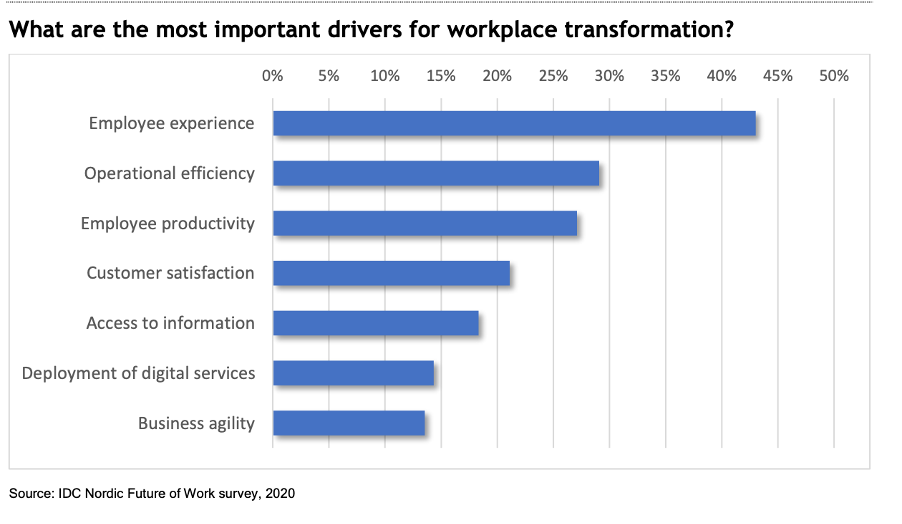
The importance of digital workplace transformation is complemented by its benefits, including improvements in:
It can be said that workplace transformation is still a work in progress. There are significant efficiency gains to be found, but companies will start by focusing on the low-hanging fruits: communication, employee experience and training.
Most companies have realized the shortage of specialist skills. Upskilling and even reskilling programs are initiated to empower existing staff, rather than finding new talent through the traditional (and expensive) recruiting and hiring process. Our report highlights key areas where companies are actively enhancing employee experience, many of which can be further strengthened with the strategic integration of automation:
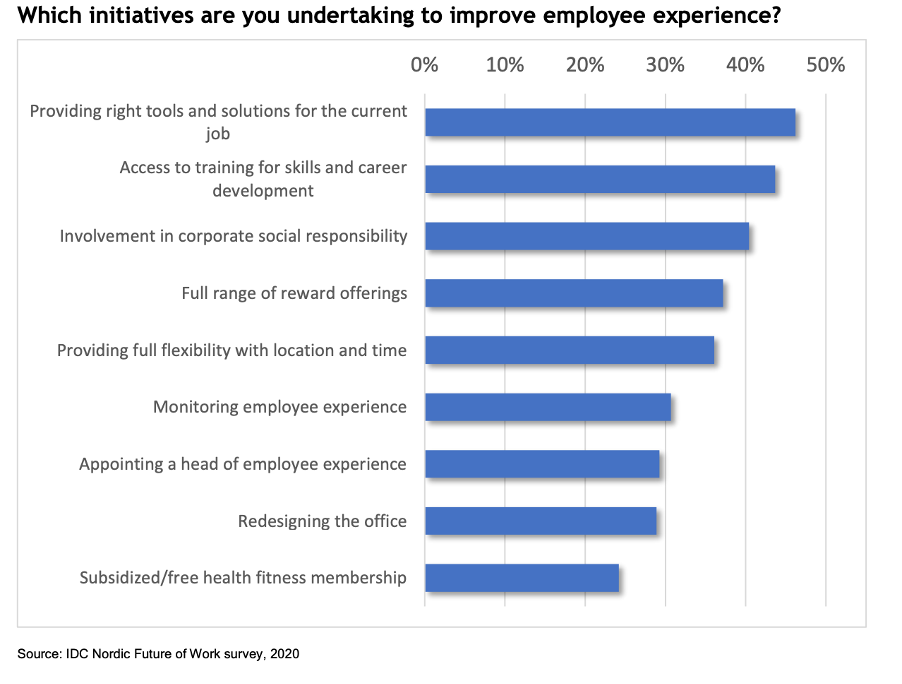
Beware – the challenges remain. Like other technologies, the lack of budget and expertise turns up as main inhibitors, followed by staff resistance and lack of management understanding.
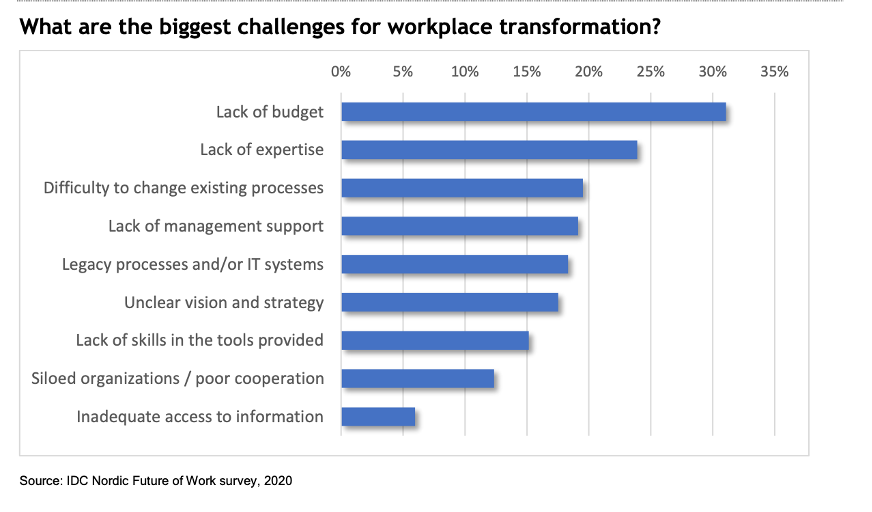
For all of you thinking about automation adoption – make sure you find the right partner with the right experience. You should also spend effort preparing and educating your staff and management. Automation can be more of a hindrance than a success if badly managed. And future projects that could be accelerated with automation will be jeopardized by its previous results.
Our report also revealed the main challenges in implementing automation, with lack of skills and experience, and staff resistance being the top two reasons.
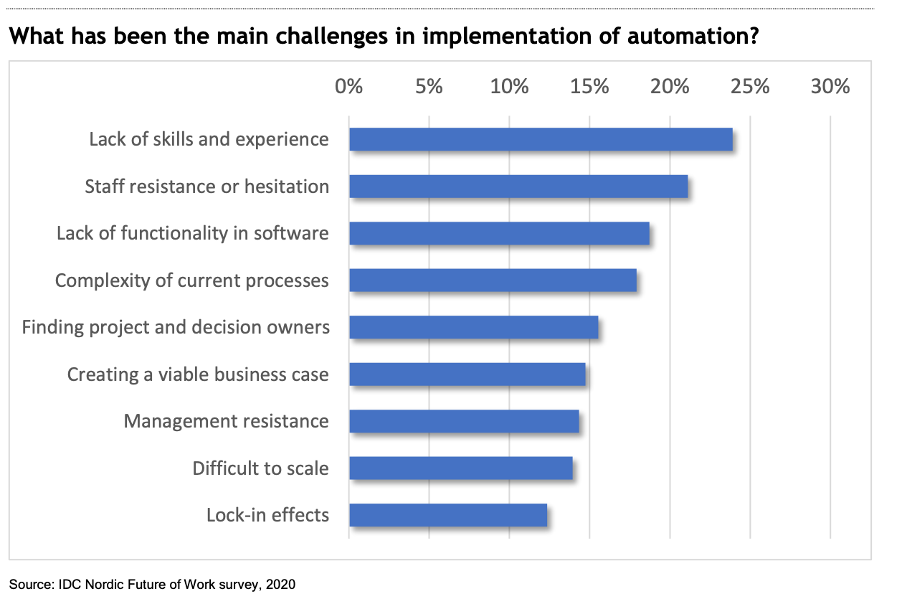
The best solution here would be to ensure employees are educated and upskilled. We recommend following a business process management (BPM) methodology, such as the SS&C | Blue Prism® Chorus BPM. Chorus is a comprehensive tool that helps organizations build and orchestrate agile, intelligent operations that deliver better business outcomes.
Digital workplace transformation can be used to address and improve several industries. Here are some examples and use cases.
Learn more about transforming finance with intelligent automation.
Learn more about transforming HR with a digital workforce.
Learn more about transforming operations in the energy and utility industry.
Digital workplace transformation can lead to streamlined processes, improved efficiency and enhanced employee experiences. Our report revealed the most common technology used for automation projects is workflow automation, with around 35% of respondents using this.
But you can use other automation tools to support digital workplace transformation. We’ve mentioned some examples before, but here are a few more:
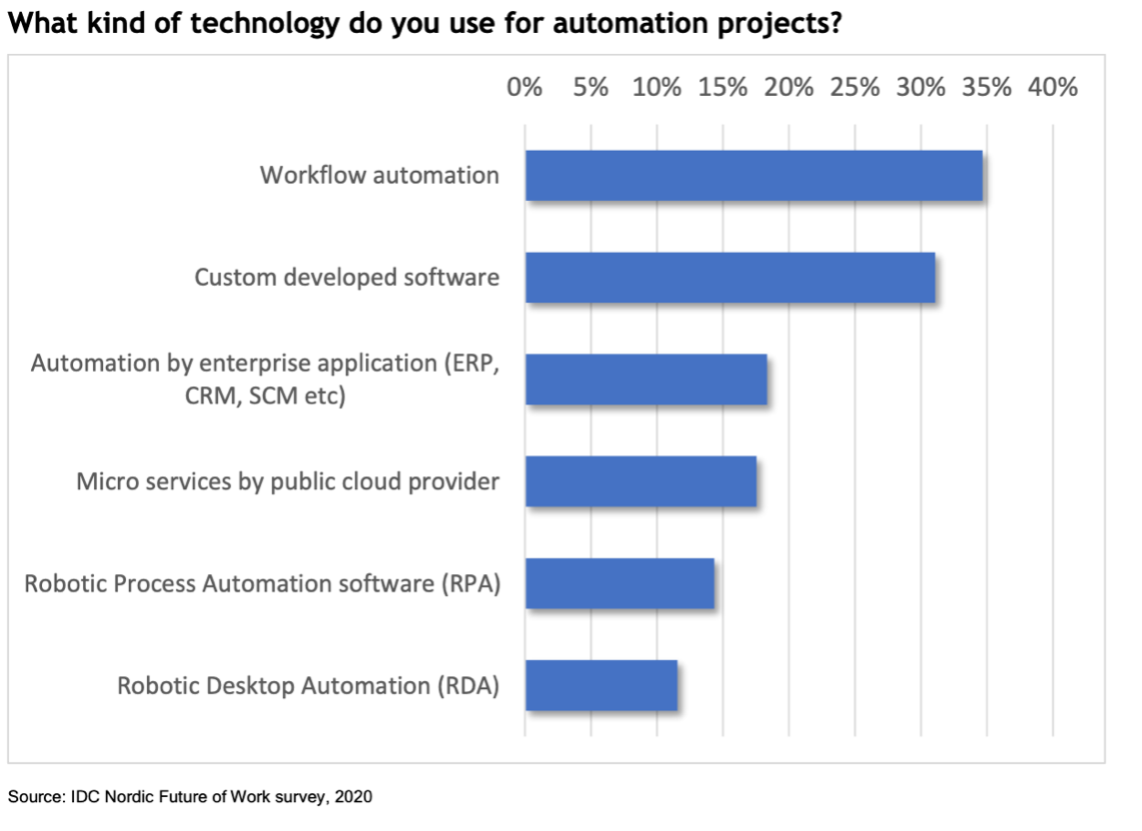
To sum it all up, employee experience is one of the key driving forces behind the adoption of digital transformation strategies. When organizations step up to ease the manual, repetitive and mundane aspects of their employees' work lives, they're not just making the workplace more enjoyable — it's a productivity booster too. It's a win-win: Organizations continue to accelerate their success and employees are right there supporting them.
If you want to learn more about the other challenges and trends in digital workplace transformation, download the full report here.
If your network blocks YouTube, you may not be able to view the video on this page. In this case, please use another device. Pressing play on the video will set third-party YouTube cookies. Please read our Cookies Policy for more information.